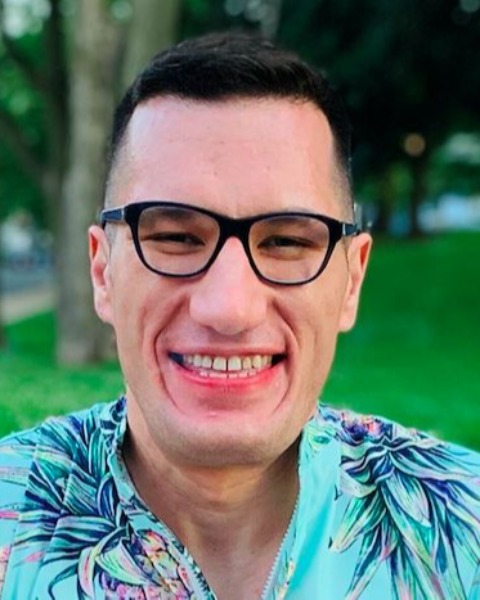Category: LGBTQ+
Symposium 144 - Conceptualizing Structural Transphobia: Measurement Innovations, Research Evidence, and Multilevel Solutions
Level of Familiarity: All
Recommended Readings: Price, M. A., & Hollinsaid, N. L. (2022). Future directions in mental health treatment with stigmatized youth. Journal of Clinical Child and Adolescent Psychology, 51(5), 810–825. https://doi.org/10.1080/15374416.2022.2109652, Hatzenbuehler, M. L. (2016). Structural stigma and health inequalities: Research evidence and implications for psychological science. American Psychologist, 71(8), 742–751. https://doi.org/10.1037%2Famp0000068, Hughto, J. M. W., Reisner, S. L., & Pachankis, J. E. (2015). Transgender stigma and health: A critical review of stigma determinants, mechanisms, and interventions. Social Science and Medicine, 147, 222–231. https://doi.org/10.1016%2Fj.socscimed.2015.11.010, ,
-

Nathan Hollinsaid, B.S. (he/him/his)
Clinical Science Doctoral Student
Department of Psychology, Harvard University
Cambridge, Massachusetts -

Maggi Price, Ph.D. (she/her/hers)
Assistant Professor
Boston College
Boston, Massachusetts -

Diane Chen, Ph.D. (she/her/hers)
Associate Professor/Director of Behavioral Health for Adolescent Medicine
Ann & Robert H. Lurie Children’s Hospital of Chicago/Northwestern University Feinberg School of Medicine
Chicago, Illinois -

Nathan Hollinsaid, B.S. (he/him/his)
Clinical Science Doctoral Student
Department of Psychology, Harvard University
Cambridge, Massachusetts -

Maggi Price, Ph.D. (she/her/hers)
Assistant Professor
Boston College
Boston, Massachusetts -
SM
Sarah McKetta, M.D., Ph.D. (she/her/hers)
Postdoctoral Fellow
Harvard Medical School
Boston, Massachusetts -
CM
Cameron Miller-Jacobs, M.P.H. (he/him/his)
Brown University
Providence, Rhode Island -
AR
Alex Rubin, M.A. (they/them/theirs)
Graduate Student
University of Denver
Denver, Colorado
Chair(s)
Discussant(s)
Presenter(s)
Recent years have seen an unprecedented rise in harmful state legislation and hateful rhetoric targeting transgender individuals and their rights across the US. Consistent with research and theory on structural stigma, these discriminatory social policies, prejudicial community attitudes, and other societal-level conditions can be conceptualized as structural forms of transphobia (Price et al., 2022). Because transphobic policies and attitudes are often enacted or can otherwise be measured at the macro (e.g., state, county, or school) level, researchers can leverage variability in the social climate surrounding transgender individuals at these levels to assess structural transphobia and its impact on psychological wellbeing. However, despite the urgent need to locate where the mental health needs of transgender youth and adults are greatest, we are aware of few such scholarly efforts.
To begin to remedy this gap, our symposium brings together leading scholars from across multiple fields (e.g., social work, public health, clinical psychology) and career stages to feature five studies that provide novel frameworks for quantifying structural transphobia and its adverse effects on transgender wellbeing. Four of these studies employed highly innovative quantitative methods (e.g., factor analysis) to measure transphobic policies and/or attitudes, which were linked to national data on transgender mental health and healthcare. A fifth and complementary study used qualitative inquiry to elucidate transgender students’ school-based experiences of structural transphobia. Results from these studies demonstrated that transgender adolescents and adults exposed to macro-social contexts characterized by higher (vs. lower) levels of structural transphobia endorsed greater psychological distress, elevated depression symptoms, and more frequent suicidality and self-injurious thoughts and behaviors, yet they had substantially lower access to the protective effects of healthcare-related resources. Findings underscore the need to develop and disseminate multifaceted strategies that not only address the mental health sequelae of structural transphobia (e.g., affirming psychological interventions) but also its correlates (e.g., provider-training interventions) and root causes (e.g., policy change efforts).
Following these five talks, our discussant will draw on their extensive research and clinical expertise in the provision of gender-affirming care to offer future directions for clinical research and practice aimed at addressing structural transphobia. Key topics of discussion include: (1) developing, testing, and deploying gender-affirming adaptations to existing cognitive-behavioral interventions to validate transgender individuals’ identities and to attend to the psychosocial consequences of chronic exposure to stigmatizing environments; (2) using app-based training interventions to increase mental health providers’ knowledge and use of gender-affirming practices; and (3) implementing structural interventions to dismantle restrictive social policies and transform prejudicial attitudes that constrain the rights, opportunities, and wellbeing of transgender youth and adults.
Learning Objectives:
- Describe 3 structural factors that contribute to transgender individuals' inequitable risk for adverse mental health outcomes.
- Identify 4 specific mental health outcomes that have been linked to transgender individuals’ experiences of structural transphobia.
- Explain innovative directions for measuring transphobia at the structural (e.g., state, county, school) level.
- Utilize supportive practices that can be incorporated into psychological interventions to affirm the experiences of transgender clients.
- Discuss solutions for addressing causes and consequences of structural transphobia at individual, interpersonal, and structural levels.

